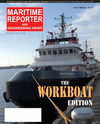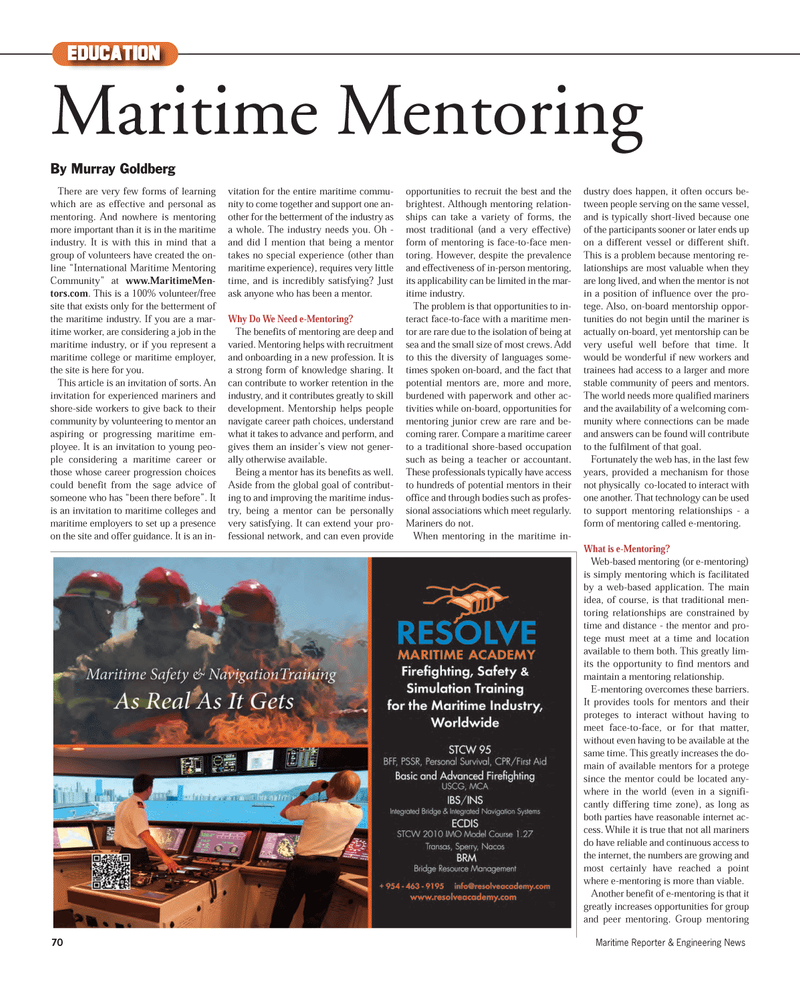
Page 70: of Maritime Reporter Magazine (November 2012)
Workboat Annual
Read this page in Pdf, Flash or Html5 edition of November 2012 Maritime Reporter Magazine
There are very few forms of learning which are as effective and personal as mentoring. And nowhere is mentoring more important than it is in the maritimeindustry. It is with this in mind that a group of volunteers have created the on- line ?International Maritime MentoringCommunity? at www.MaritimeMen- tors.com. This is a 100% volunteer/free site that exists only for the betterment of the maritime industry. If you are a mar- itime worker, are considering a job in the maritime industry, or if you represent a maritime college or maritime employer, the site is here for you.This article is an invitation of sorts. An invitation for experienced mariners and shore-side workers to give back to their community by volunteering to mentor an aspiring or progressing maritime em-ployee. It is an invitation to young peo- ple considering a maritime career orthose whose career progression choicescould benefit from the sage advice of someone who has ?been there before?. Itis an invitation to maritime colleges and maritime employers to set up a presence on the site and offer guidance. It is an in- vitation for the entire maritime commu-nity to come together and support one an-other for the betterment of the industry asa whole. The industry needs you. Oh - and did I mention that being a mentortakes no special experience (other than maritime experience), requires very little time, and is incredibly satisfying? Justask anyone who has been a mentor. Why Do We Need e-Mentoring? The benefits of mentoring are deep and varied. Mentoring helps with recruitment and onboarding in a new profession. It is a strong form of knowledge sharing. It can contribute to worker retention in the industry, and it contributes greatly to skill development. Mentorship helps people navigate career path choices, understand what it takes to advance and perform, and gives them an insider?s view not gener- ally otherwise available. Being a mentor has its benefits as well. Aside from the global goal of contribut- ing to and improving the maritime indus- try, being a mentor can be personally very satisfying. It can extend your pro- fessional network, and can even provide opportunities to recruit the best and thebrightest. Although mentoring relation- ships can take a variety of forms, the most traditional (and a very effective) form of mentoring is face-to-face men- toring. However, despite the prevalence and effectiveness of in-person mentoring, its applicability can be limited in the mar- itime industry. The problem is that opportunities to in-teract face-to-face with a maritime men- tor are rare due to the isolation of being atsea and the small size of most crews. Add to this the diversity of languages some- times spoken on-board, and the fact that potential mentors are, more and more,burdened with paperwork and other ac- tivities while on-board, opportunities for mentoring junior crew are rare and be- coming rarer. Compare a maritime career to a traditional shore-based occupationsuch as being a teacher or accountant.These professionals typically have access to hundreds of potential mentors in theiroffice and through bodies such as profes- sional associations which meet regularly. Mariners do not.When mentoring in the maritime in-dustry does happen, it often occurs be-tween people serving on the same vessel, and is typically short-lived because one of the participants sooner or later ends upon a different vessel or different shift. This is a problem because mentoring re-lationships are most valuable when they are long lived, and when the mentor is not in a position of influence over the pro- tege. Also, on-board mentorship oppor- tunities do not begin until the mariner is actually on-board, yet mentorship can bevery useful well before that time. It would be wonderful if new workers and trainees had access to a larger and more stable community of peers and mentors.The world needs more qualified mariners and the availability of a welcoming com- munity where connections can be madeand answers can be found will contribute to the fulfilment of that goal. Fortunately the web has, in the last few years, provided a mechanism for those not physically co-located to interact with one another. That technology can be used to support mentoring relationships - aform of mentoring called e-mentoring. What is e-Mentoring?Web-based mentoring (or e-mentoring) is simply mentoring which is facilitated by a web-based application. The main idea, of course, is that traditional men-toring relationships are constrained bytime and distance - the mentor and pro-tege must meet at a time and location available to them both. This greatly lim- its the opportunity to find mentors and maintain a mentoring relationship.E-mentoring overcomes these barriers. It provides tools for mentors and their proteges to interact without having to meet face-to-face, or for that matter, without even having to be available at the same time. This greatly increases the do- main of available mentors for a protege since the mentor could be located any- where in the world (even in a signifi- cantly differing time zone), as long as both parties have reasonable internet ac- cess. While it is true that not all mariners do have reliable and continuous access to the internet, the numbers are growing and most certainly have reached a point where e-mentoring is more than viable.Another benefit of e-mentoring is that it greatly increases opportunities for groupand peer mentoring. Group mentoring70Maritime Reporter & Engineering News EducationMaritime Mentoring By Murray Goldberg MR#11 (66-73):MR Template 11/6/2012 8:52 PM Page 70

 69
69

 71
71
